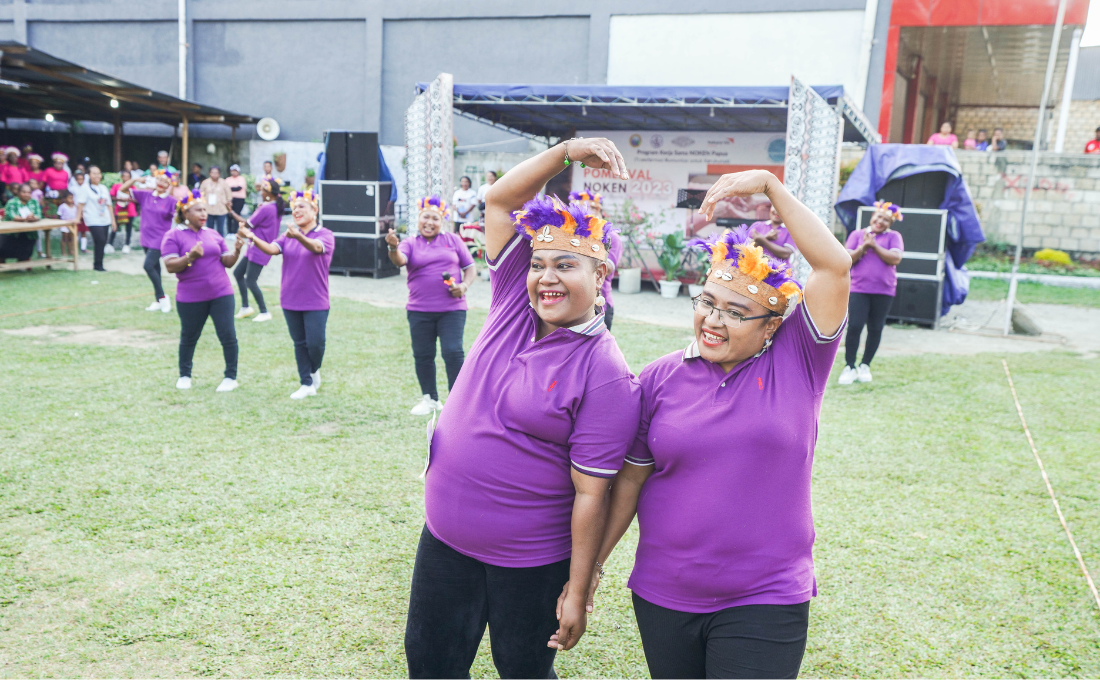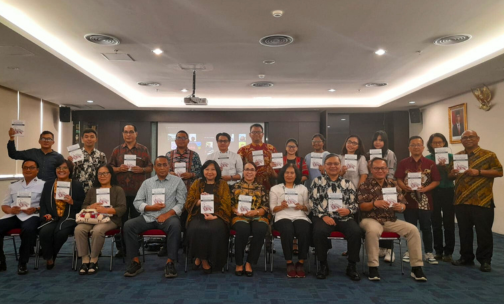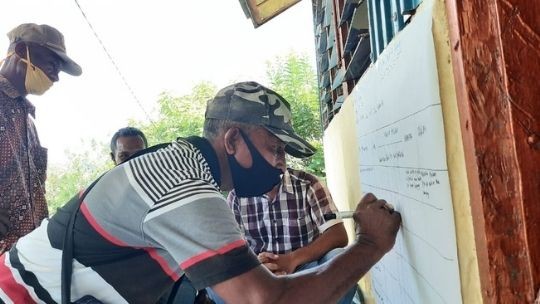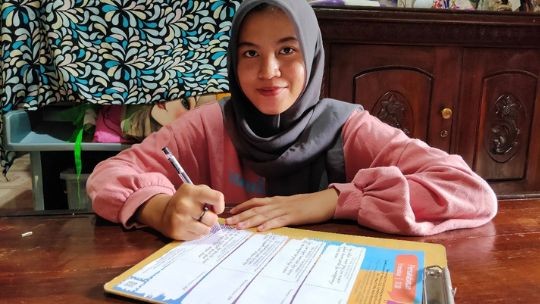The Power of Mama: Papuan Women Nurturing Harmony Through Creative Activities

"Let us recognize our identity as God's powerful creation.
Recognize and manage conflict, because conflict cannot be avoided but can be managed into opportunities to make us more mature in addressing life's problems.
Seeing conflict from various perspectives so that it can create a good environment without wrong perceptions.
Communicate with compassion to everyone, especially in dealing with a conflict.
Build relationships between people to create harmony.
Build a good vision and mission in life to achieve harmony in society,".
The message above echoed through the courtyard of a church in Jayapura, Papua, reaching the ears of hundreds of cross-ethnic and religious residents who attend The Power of Mama Expo and Festival (Pomexval). This creative activity was held on August 10-12, 2023. This activity is in collaboration with the NOKEN project implemented by WVI with local partners.
Pedestrians who pulled over to watch the mama-mama gymnastics were listening to those messages. The women, who became the committee, voiced the key messages they received from the Empowered Worldview (EWV) Building Harmony training. They hoped the community would know the purpose of the activity they were working towards: community social cohesion. "We repeat the message of harmony so that people who participate can understand the purpose of the activity. Although many have not participated in the training or have forgotten the training materials, they are reminded of the messages of harmony so that all challenges and conflicts can be resolved properly," said Mama Alva, chairperson of the Pomexval committee.
"The Power of Mama makes us remember the positive work of all mothers in the Land of Papua. As the name implies, The Power of Mama reflects the power of women. This is extraordinary," said Jayapura Regency Secretary Hana Hikoyabi in her speech.
Women in the three districts (Jayapura, Biak and Jayawijaya) have made important strides as empowered agents who realize a shared vision for harmony. This is evidenced by the realization of follow-up actions from the training to strengthen relations between community groups. Not only that, the various activities initiated by women also contribute to the environment, developing the knowledge, talents and skills of residents. Still in the Pomexval series, Jayapura women held an interfaith cleanup action, yosim pancar (a typical Papuan coastal folk dance) competition, gymnastics creation, drama/film on the theme of harmony, culinary bazaar and local handicrafts. There was also training in makeup, fashion, and socialization of early detection of cervical cancer. Women from Wamena Kota and North Biak districts held culinary training using local ingredients including tubers. Biak Kota women held training on noken and stick weaving. Other women in one district in Biak held futsal and volleyball competitions for women.
"The women are very enthusiastic about participating in the activities. From young to old, they are happy to participate in the activities. Hopefully, the cooperation with the clasis will continue so that they can nurture the talents of the Women's Fellowship members. So far, it has been vacuumed due to lack of interest from the congregation," said Mama Fatmawati, the Pomexval committee member. The other committee responded that one of the factors for the vacuum of activities like this was due to poor relations with other congregations.
It is not easy for some areas to organize cross-group events. For example, residents of two villages in one district of Biak rarely organize activities together because of distance. Not geographical distance, but social distance. According to a community leader, the residents of village A have a higher level of education and social status, so the residents of village B keep their distance and the two villages rarely mingle.
However, through activities such as Pomexval, both the committee and the participants felt a change in perception or an improvement in relations during this closely working moments. "At first we were annoyed with them (residents of village A) because they were late for the activity. But along the way, we rejoice together and no longer get angry. Unfortunately, there was an incident that injured a participant. But after that, I think we became more united, caring for each other," said one of the mothers from village B after the activity.
The same thing was also found in Jayapura. "Initially there were friends who did not accept the involvement of interfaith organizations, but after they heard messages of harmony and the purpose of the activity, they could accept. It was a joy to involve other religions, even the technical meeting was led by a Muslim jury in the church. This made people's perceptions more open to other groups. Cross-group competitions also mature us to be wiser and more sportive," said Mama Alva.
"This activity unites everyone including those who do not share the same understanding. Residents, including Muslims, are very happy with the activity, because it is a very rare moment to hold this kind of activity in the church that is open to the general public. Usually, interfaith activities are only worship services and even then only meet once in a while. But from this activity we can get to know each other more deeply," said Mama Emiliana, a Pomexval organizer.
"These women's activities really have an impact on relationships. There were some women who didn't like each other at first, but because they met often and interacted during the activities, they are now good friends," says Mama Mien, facilitator of the noken weaving training in Biak Kota.
Furthermore, women gained additional experience in organization, including conflict management. At that time, the yosim pancar competition was about to begin. All participants were dressed in their finest costumes and the audience was packed. Suddenly, rain poured down on the field.
"There was tension and disagreement when it rained, whether to keep the yosim pancar held on the field with the risk of injury or move the location, while time was running out. But we tried to calm each other down and finally managed to finish. The MCs kept encouraging us while singing hymns," Mama Alva said. The committee decided to took a vote with the participants' representatives, and it was agreed that the location would remain and everyone was willing to wait for the rain to stop.
"This is the first time I've participated in a cross-congregation activity, getting to know each other and straightening out perceptions about new people. In this committee we learned time discipline and structure, knew what to say to whom according to their functions, learned conflict mitigation because there were participants who did not accept the results of the competition. We don't have to respond to all comments or objections so that they don't get bigger, just understand them," said Mama Sisca.
The message of harmony is further strengthened by the fragment or content competition with message of harmony as the main theme. Through this competition, women across congregations competed creatively in spreading the message of harmony through role-playing and videography. These contents left an impression on the audience.
"Patience and the power of prayer. These two things are the strength of women. Many say that women are weak. Actually, women have a lot of strength. Women are not only husband's companion, but also have professionalism in the world of work, society, and parenting towards a better life. I believe women can bring many good changes as long as they have sincerity. The content created by these ladies is very touching and modern. I hope this cooperation program with WVI is not only short-term, seeing the extraordinary enthusiasm of the residents," said Elpina Situmorang, first assistant for Government Affairs of Jayapura Regency.
Hendra Morin, a videographer in Papua who were the jury of the harmony content competition also appreciated, "Appreciation for Papuan mothers who have the courage to film and dare to act. I, who work in the field of videography, may not be brave enough. Hopefully we can continue to make fragments that spread messages of harmony and positive change for Papua,".
There is another important thing that is a breath of fresh air for equality and harmony: male support.
"I was impressed by the village women who took the time to attend the festival all day, because usually the men do not allow their wives to participate in activities for a long hours. There was once a woman who was scolded by her husband in public for participating in activities and leaving the house from morning to night. Women have a great desire to participate in activities," said Mama Ocha, MC of Pomexval.
"I appreciate the fathers who are here today. It has been very difficult for us to appreciate our wives. Tonight, I would like to thank the mothers who have only been in the kitchen, today is extraordinary. Appreciation also for the residents who have made fragments containing messages of harmony. In these three days there has been a change, a renewal. If we have been in conflict with each other, in this activity we must greet each other in love. Mothers become the power, the driver of change in the family and congregation. Thank you to WVI for working together with GKI Klasis Sentani (local Church in Sentani) to bring change in the community," concluded Peter Walli, deputy secretary of the clasis at the closing of the Pomexval.
Author: Andina Larasati (MEL Coordinator for NOKEN Project)
Editor: Mariana Kurniawati (Communication Executive)



